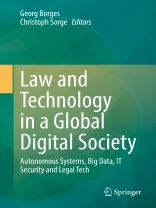This book examines central aspects of the new technologies and the legal questions raised by them from both an international and an inter-disciplinary perspective. The technology revolution and the global networking of IT systems pose enormous challenges for the law. Current areas of discussion relate to autonomous systems, big data and issues surrounding legal tech. Ensuring data protection and IT security as well as the creation of a legal framework for the new technology as a whole can only be achieved through international and inter-disciplinary co-operation.
The team of authors is made up of experienced, internationally renowned experts as well as young researchers and professionals who give valuable insights from numerous different jurisdictions. This book is written for jurists and those responsible for technology in public authorities and companies as well as practising lawyers and researchers.
Spis treści
Part 1: Artificial Intelligence.- Legal Framework for AI.- “Moralizing Technology” and Criminal Law theory.- Liability for AI.- Machine Learning decision-making: when algorithms can make decisions according to the GDPR.- Algorithmic Suspicion in the Era of Predictive Policing.- Part 2: Data Protection.- The Fundamental Right to Data Protection of Blockchain Users seen through the Applicability of the GDPR.- The insurmountable trade-off: Efficiency vs. Human Rights in the area of AI.- Virtual Personal Assistants and European data Protection Law. GDPR & E-Privacy-Reg.- GDPR compliance for East European non-EU companies.- Part 3: IT Security.- IT Security measures and their impact on data protection.- The Legal Framework for IT Security in the “Industry 4.0”.- The Role of Criminal Law in Regulation Cybercrime and IT Security.- Phishing in Online Banking – an Overview Internet of Things and Consumers’ Privacy in a Brazilian perspective: Cybervulnerability and Dialogue of sources.-Part 4: Legal Tech. Legal Tech and computational legal Theory.- Smart Contracts in Civil Law Countries: Legislative Analysis and Perspectives of Regulation.- Crowdsourcing as a Means for Participatory Legislation.
O autorze
Georg
Borges is Professor of Civil Law, Legal Informatics, German and International Business Law and Legal Theory and the managing director of the Institute for Legal Informatics at Saarland University, Germany. From 2004 to 2014, he was Professor of Law at Ruhr-University Bochum. Beside this, he was also a judge at the State Court of Appeals, Hamm Circuit. As an expert on business law with a focus on IT Law, Prof. Borges authored several books and numerous articles in the field of IT law. His current research is related to artificial intelligence, Internet of Things and data protection law.
Christoph Sorge received his Ph D in computer science from Karlsruhe Institute of Technology. He then joined the NEC Laboratories Europe, Network Research Division, as a research scientist. From 2010, Christoph was an assistant professor (’Juniorprofessor’) for Network Security at the University of Paderborn. He joined Saarland University in 2014, where he is now Full Professor of Legal Informatics in the Faculty of Law and a co-opted Professor of Computer Science. He is an associated member of the CISPA – Helmholtz Center for Information Security, a senior fellow of the German Research Institute for Public Administration, and a board member of the German Association for Computing in the Judiciary. His research area is the intersection of computer science and law, with a focus on data protection.












